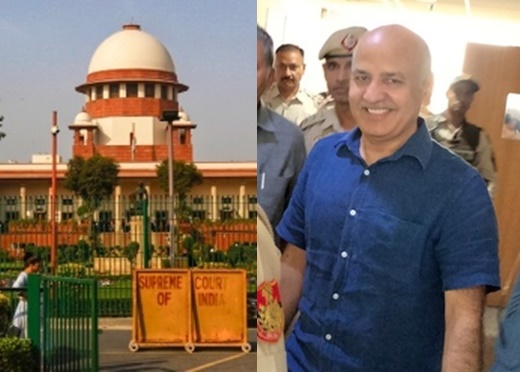‘Rs 338 cr transfer tentatively established’: SC denies bail to Manish Sisodia, gives timeframe for trial
New Delhi: The Supreme Court on Monday dismissed former Delhi Deputy CM Manish Sisodia’s bail plea in the excise policy case, saying among other charges, the “transfer of Rs 338 crore is tentatively established”
In their ruling, the bench of Justices Sanjiv Khanna and S.V.N. Bhatti referred to the mandate established by the apex court’s judgement in Vijay Madanlal Choudhary case that upheld the Enforcement Directorate’s powers under the Prevention of Money Laundering Act (PMLA).
“Referring to Section 45 of the PML Act, in Vijay Madanlal Choudhary (supra), the three Judges’ Bench has opined that the provision does not require that to grant bail, the court must arrive at a positive finding that the applicant has not committed an offence under the PML Act. Section 45 of PMLA must be construed reasonably as the intent of the legislature cannot be read as requiring the court to examine the issue threadbare and in detail to pronounce whether an accused is guilty or is entitled to acquittal. Further, an order on an application for bail is passed much before the end of trial and sometimes even before commencement of trial. Lastly, it is trite, that for the purpose of considering an application for bail, although detailed reasons are not necessary to be assigned, and, therefore, the evidence need not be weighed meticulously, a tentative finding should be recorded on the basis of broad probabilities,” it said.
Justice Khanna, while delivering the judgement, said that even as many questions remain unanswered, one aspect with regard to the transfer of Rs 338 crore is tentatively established.
The CBI charge sheet has alleged that Manish Sisodia was aware that three liquor manufacturers have 85 per cent share in the liquor market in Delhi. Out of them, two manufacturers had 65 per cent share, while 14 small manufacturers had 20 per cent market share.
“As per the term in the new excise policy – each manufacturer could appoint only one wholesale distributor, through whom alone the liquor would be sold. At the same time, the wholesale distributors could enter into distribution agreements with multiple manufacturers. This facilitated getting kickbacks or bribes from the wholesale distributors having substantial market share and turnover,” the SC order quoted CBI’s charge sheet as saying.
The CBI has further held in its charge sheet that the licence fee payable by the wholesale distributor was a fixed amount of Rs 5 crore only and not dependant on the turnover. The new policy facilitated big wholesale distributors, whose output towards the licence fee was fixed.
“The policy favoured and promoted cartelisation. Large wholesale distributors with high market share because of extraneous reasons and kickbacks, were ensured to earn exorbitant profits. Mahadev Liquor, who was a wholesale distributor for 14 small manufacturers, having 20 per cent market share, was forced to surrender the wholesale distributorship licence. Indo Spirit, the firm in which the liquor group had interest, was granted whole distributor licence, in spite of complaints of cartelisation etc. which were overlooked. The complainant was forced to take back his complaint,” the CBI has said in its charge sheet.
It alleges that the excess amount of 7 per cent commission/fee earned by the wholesale distributors of Rs 338 crore constitute an offence as defined under Section 7 of the PoC Act, relating to a public servant being bribed. (As per the ED, these are proceeds of crime).
“This amount was earned by the wholesale distributors in a span of ten months. This figure cannot be disputed or challenged. Thus, the new excise policy was meant to give windfall gains to select few wholesale distributors, who in turn had agreed to give kickbacks and bribes.” the order quoted from CBI charge sheet.
However, the court has observed in its judgement that ED’s complaint alleging a Rs 100 crore kickback paid by the liquor group “is somewhat a matter of debate.”
“…the assertion in the complaint filed with the DoE that kickback of Rs 100 crore only was actually paid by the liquor group is somewhat a matter of debate. However, there is an assertion, and the DoE has relied on evidence and material, that a portion thereof, that is, Rs 45 crore was transferred through Hawala for the Goa election and used by AAP, a political party, which is a juristic person. AAP is not being prosecuted. The charge that the appellant – Manish Sisodia is vicariously liable in terms of Section 70 of the PML Act cannot be alleged and has not been argued.”
The detailed order by the top court also said that there is no specific allegation regarding the involvement of Sisodia in the transfer of Rs 45 crore to AAP for the Goa elections.
“Prima facie, there is lack of clarity, as specific allegation on the involvement of the appellant – Manish Sisodia, direct or indirect, in the transfer of Rs 45 crore to AAP for the Goa elections is missing.”
The top court has also directed the ED and the CBI that Sisodia’s trial should be completed within six to eight months. The bench further added that within three months, if the trial proceeds slowly, Sisodia can file an application for bail again.
In July, the Delhi High Court denied bail to Sisodia.
A bench of Justice Dinesh Kumar Sharma had said that Sisodia was not able to meet the twin conditions for grant of bail under the PMLA, and the triple test for grant of bail. On October 20, a Delhi court extended the judicial custody of Sisodia arrested in connection with the alleged irregularities in the now-scrapped excise policy case. The court directed counsel for accused persons – Kuldeep Singh, Vijay Nair, Sameer Mahendru, Rajesh Joshi, and more – to inspect un-relied documents in the Delhi excise policy case at CBI Headquarters, and adjourned the matter till November 22.
–IANS


Comments are closed.